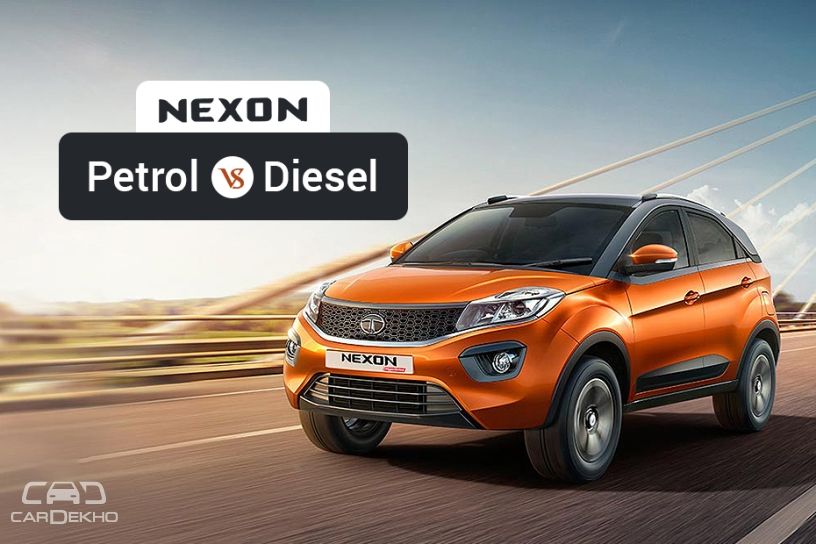Tata Nexon Petrol vs Diesel: Real-World Performance Comparison
Modified On Jan 03, 2019 01:32 PM By Dhruv Attri
- Write a comment
Which derivative of Tata’s popular compact SUV would suit your driving style better? We find out in our real world tests
The Nexon has been a popular pick from Tata’s lineup among buyers ever since it was launched in 2017. Both its petrol and diesel engines produce the same amount of power, but which one excels in the real world when it comes to quick overtakes, off-the-line acceleration and braking? We reveal it all.
Specifications
| Tata Nexon 1.2 L Petrol |
Tata Nexon 1.5 L Diesel |
|
| Displacement |
1198cc |
1497cc |
| Power |
110PS |
110PS |
| Torque |
170Nm |
260Nm |
| Transmission |
6MT/ 6AMT |
6MT/6AMT |
| Fuel Efficiency(tested) |
14.03kmpl (city),17.89kmpl(highway) |
16.80kmpl (city),23.97kmpl(highway) |
The Tata Nexon is powered by the same 1.2-litre Revotron petrol engine that powers the Tiago hatchback but it’s turbocharged in the former. Thanks to which, it makes 110PS of maximum power and 170Nm of peak torque as compared to the petrol Tiago’s 85PS/114Nm. The diesel engine of the Nexon, on the other hand, is the most powerful among its rivals; it makes 110PS of maximum power.

Acceleration and Roll-Ons
| 0-100kmph |
30-80kmph (3rd gear) |
40-100kmph (4th gear) |
|
| Tata Nexon petrol |
11.64s |
10.91s |
19.09s |
| Tata Nexon diesel |
13.25s |
7.82s |
13.35s |
| Difference |
1.61s (diesel slower) |
3.09s (petrol slower) |
5.74s (petrol slower) |
Diesel cars have better roll-on times compared to petrol ones because they are torquier and the high torque is spread across a wider rev range, in general. Similarly, the Nexon’s diesel engine also produces more torque than its petrol engine, even though the 1.2-litre petrol motor is also turbocharged. Also Read: Tata Tiago Petrol Manual vs Automatic - Real-World Mileage Comparison
So, while the diesel Nexon is slower than the petrol in the 0-100kmph sprint by 1.6 seconds, it is 3.09 seconds quicker than the petrol in 30-80kmph and 5.74 seconds in the 40-100kmph run.

Braking
| 100-0kmph |
80-0kmph |
|
| Tata Nexon petrol |
40.63m |
25.58m |
| Tata Nexon diesel |
41.58m |
26.34m |
The Tata Nexon, in both the guises, is equipped with disc brakes up front and drum brakes at the rear. This is also evident from the similar distances that the two cars cover before coming to a halt. That said, the petrol-powered Nexon stops just a bit earlier than the diesel one. This is probably due to its slightly lower kerb weight of 1188kg (against 1250kg of the diesel) which in turn results in a lower momentum.
So, which version should you pick? Since the difference between the diesel and petrol Nexon is nearly Rs 1 lakh for all variants, it makes sense to go for the diesel if your average usage is over 30km/day. However, if your driving is usually limited to the city, we would recommend the petrol. The difference between the mileage of the diesel and petrol versions is lesser within the city compared to highway. The diesel, however, will be better if your driving includes highways since it rolls on faster than the petrol, making it better at executing clean overtakes on the highways. In fact, it is significantly more fuel efficient on open roads too.
Also Read: Upcoming SUVs In 2019: Tata Harrier, Renault Duster, Nissan Kicks, Mahindra XUV300 & More Cars
Read More on : Tata Nexon on road price
















